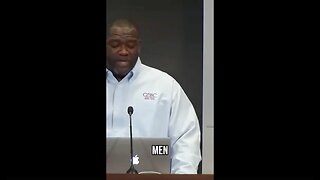Premium Only Content

The Myth of Neutrality: Basic Training For Defending The Faith -- Part 1 -- Greg Bahnsen
In Lecture One, Dr. bahnsen opens by considering a vitally important question: Whether or not you should be neutral regarding your Christian commitment while arguing for the existence of God to an unbeliever. Many Christians attempt to reach either the atheist or the agnostic6 by saying something to the effect: “I will set aside my belief in God so that I can prove to you that He exists. I will not depend upon my faith, so that I can show you that the God’s existence is reasonable and not just my personal bias.” They will often say: “I believe that there are good, independent, unbiased reasons that can lead you to the conclusion that God exists.”
Join this channel to support our work:
https://www.youtube.com/channel/UC64LSY9kgiMC4hOAbCwcuYg/join
The Myth of Neutrality: Basic Training For Defending The Faith -- Part 1 -- Greg Bahnsen
Reviewed by Monergism.com:
The responsibility of Christians to proclaim and defend their faith reasonably and intelligibly, in the face of worldviews and philosophies that are antagonistic to Christianity, is a serious biblical concern. So how do we go about equipping ourselves for the task? In order to defend the faith adequately, must we be current with the prevalent philosophies and epistemologies of the day, and eloquent enough to mount a persuasive argument within the confines of those philosophies? In other words, must we be skillful enough thinkers to beat the atheists on their own playing field? No, Dr. Bahnsen would insist; although understanding philosophy and epistemology may be useful, ultimately, if we would be successful apologists, we only need to learn to think as Christians. And in this clear, scriptural, penetrating series of lectures, he demonstrates exactly what that means, and how it can equip any Christian to be a biblical and competent apologist.
What is the goal of apologetics? Is it to persuade men to embrace Christianity, to out-reason unbelievers into the Kingdom? Bahnsen would suggest, on the contrary, that while conversion is the ultimate goal, that end is properly the work of the Holy Spirit; our task is just to stop the mouths of unbelievers, to leave them without excuse, and let the Spirit work as he will in a heart whose self-deception has been uncovered. And make no mistake, the unbeliever is self-deceived. His problem is not that he's an unbiased, reasonable man who just doesn't have enough evidence for the existence of God; his problem is that he hates God and suppresses the truth, so that he can justify his pursuit of ungodliness. He claims that he wants to examine evidences for Christianity from a neutral platform; but if there's one thing we must know about apologetics, it's that he's not neutral, and we shouldn't be. To attempt to meet him on his terms, to enter his anti-God worldview in order to convince him of what he already knows but suppresses in ungodliness, is to lose the battle from the beginning; it's to justify him in his presuppositions, which are utterly opposed to the message we have to give him.
So then, how do we go about the task of defending the faith to unbelievers and atheists? Bahnsen would suggest that we simply take those Christian truths which even the unbelievers cannot give up – things such as moral absolutes, human dignity, the existance of universals, the one and the many, the uniformity of reality – and show how, on the basis of their own presuppositions, they are impossible, unintelligible, self-contradictory. Those things about which they express moral outrage, whether it be the abuse of children, the war in Iraq, or any other issue, demonstrate that they do not actually believe what they say they believe about reality. In fact, they must borrow from the Christian worldview even to advance those opinions. Really, the basic “proof” of Christianity is that, without it you cannot prove anything.
Of course, this is essentially just a presentation of the principles of what is called “presuppositional” (in contrast to “classic,” or “evidential”) apologetics. And as Bahnsen walks through scriptural principles and examples, he builds up a compelling case that the approach of presuppositional apologetics is uniquely faithful to the biblical witness. It is unique both in its refusal to compromise on the non-negotiable tenets of the Christian worldview and in its ability to “shut the mouths” of unbelievers, and make clear their inconsistency and self-deception.
greg bahnsen,critical thinking,critical thinking skills,critical thinking exercises,greg bahnsen debate,greg bahnsen presuppositional apologetics,critical thinking examples,greg bahnsen basic training,apologetics christian,apologetics 101,greg bahnsen apologetics,greg bahnsen myth of neutrality
-
 0:16
0:16
Grace Family Baptist Church
2 days ago $0.01 earnedIf You Love Your Neighbor - Voddie Baucham
102 -
 1:06:44
1:06:44
Talk Nerdy 2 Us
21 hours ago🔥 Hackers vs. The World: From Amazon breaches to FBI-confirmed Chinese telecom spying
2.38K13 -
 1:24:20
1:24:20
Vigilant News Network
19 hours agoJoe Rogan Drops Shocking Election Claim | The Daily Dose
79.3K78 -
 1:10:18
1:10:18
FamilyFriendlyGaming
18 hours ago $15.47 earnedCat Quest III Episode 2
80.9K1 -
 20:07
20:07
DeVory Darkins
23 hours ago $15.56 earned"They Talking About Finance!" The View FRUSTRATED by NYC Mayor TRUTH BOMB
54.2K49 -
 1:20:18
1:20:18
Steve-O's Wild Ride! Podcast
2 days ago $8.89 earnedThe Hawk Tuah Girl Is Really Becoming Successful! - Wild Ride #243
39K3 -
 1:29:26
1:29:26
Game On!
19 hours ago $8.25 earnedJon Jones vs Stipe Miocic Heavyweight Title Fight | UFC 309 Preview
41.5K4 -
 30:26
30:26
The Why Files
7 days agoThe Pascagoula UFO Incident | When Nightmares Come True
73.6K60 -
 1:40:28
1:40:28
Roseanne Barr
1 day ago $64.64 earnedUnredacting Jesus with Billy Phillips | The Roseanne Barr Podcast #74
158K174 -
 55:49
55:49
Stephen Gardner
23 hours ago🔥SECRET TRAPS laid for Trump, RFK & ELON | Megyn Kelly worries for Trump's life, CIA vote algorithm.
57K105